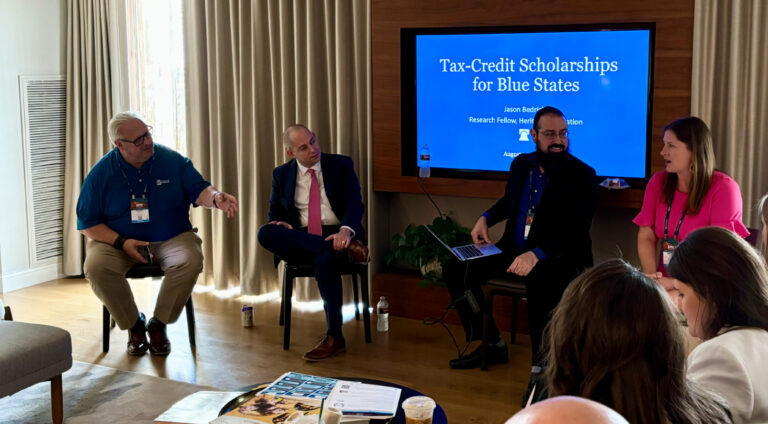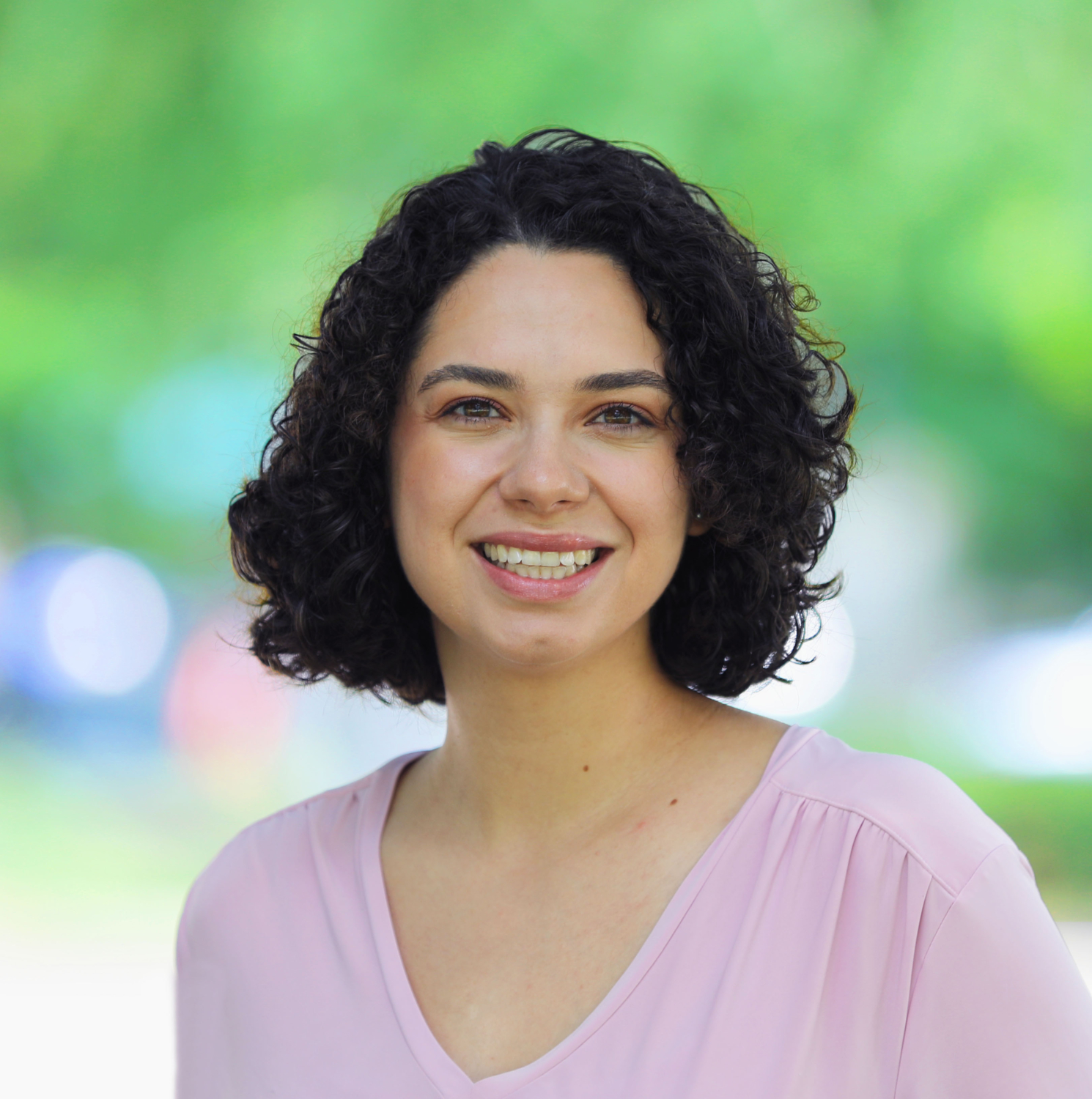Navigating School Choice in Blue States: Opportunities, Challenges, and Strategies
In the world of school choice advocacy, blue states present unique challenges where political dynamics make it difficult to pass traditional private school choice measures such as vouchers or Education Savings Accounts (ESAs). “Overcoming barriers to education freedom in Blue States” was the topic of discussion across various sessions at State Policy Network’s recent Annual Meeting.
EdChoice’s “Playing the Long Game on Education Freedom Advocacy in Blue States” panel brought together Robert Enlow, President and CEO of EdChoice; Jason Bedrick, Research Fellow at the Heritage Foundation; Andrew Campanella, President and CEO, National School Choice Awareness Foundation; and Jennifer Daniels, Special Advisor at the American Federation for Children: The Catholic Schools Project; to dive into the policy alternatives, the messaging, and the advocacy strategies that could be employed to advance school choice in these environments.
Jason Bedrick: The Power of Tax Credit Scholarships
Jason Bedrick opened the discussion by highlighting the potential of tax credit scholarships as a viable alternative in blue states, where vouchers and ESAs are often politically unfeasible. “Tax credit scholarships are still the most popular form of private school choice,” Bedrick explained, “but they’re also the least understood.” He pointed out that in many blue states, the very mention of vouchers is a non-starter, and even ESAs—often dubbed “vouchers on steroids”—face significant opposition.
Bedrick emphasized that the challenge with ESAs and other choice programs is often rooted in public misunderstanding. “People confuse Education Savings Accounts with college savings accounts. They’re still very new, and not very well understood,” he said. He also referenced a chart from EdChoice showing that tax credit scholarships consistently rank high in favorability, even among Democrats. “In blue states, we see that tax credit scholarships come in number one in terms of favorability,” Bedrick noted, adding that 23 states have enacted some form of tax credit scholarships.
Bedrick’s third key point was the importance of universal eligibility. While social justice concerns drive much of the advocacy in blue states, he warned that targeting programs solely to low-income families can render them politically vulnerable. “Milton Friedman often said, ‘Programs for the poor are poor programs,’ and that’s because lower-income families don’t have the political capital to defend a program when it’s in jeopardy.” Instead, Bedrick argued for universal programs that prioritize low-income families but include broader eligibility to ensure political sustainability.
Andrew Campanella: The Role of Messaging and Coalitions
Andrew Campanella spoke next, exploring the critical importance of messaging and coalition-building in blue states. He cautioned against framing school choice advocacy as an attack on public schools. “There is no type of school choice that public sector teachers’ unions like,” he acknowledged. However, he was quick to point out that messaging should not be overtly anti-public school. “We need to make sure we’re not anti-union as a whole. There are other unions, like trade unions, that want more opportunities for kids and would support certain kinds of school choice.”
One of Campanella’s key recommendations was to seek out new allies and frame school choice in ways that resonate with progressive constituencies. In Indiana, for example, a Career and Technical Education (CTE) tax credit has found success by aligning with industries and trade unions. “Start thinking about finding different groups of constituents that are more aligned with the Democratic Party,” Campanella advised. This approach, he argued, can help advocates build a broad coalition of supporters, even in traditionally hostile environments.
Finally, Campanella emphasized the long-term nature of school choice advocacy. “You can’t just try to do it in one year,” he warned. “Building a broad coalition and having good messengers in a blue state, while playing the long game, is essential.” His takeaway message was clear: success in blue states requires patience, creative thinking, and alliances with unexpected partners.

Robert Enlow, Andrew Campanella, Jason Bedrick, and Jennifer Daniels.
Jennifer Daniels: Engaging School Leaders and the Role of Private Schools
Jennifer Daniels, an expert on Catholic schools and private school advocacy, provided valuable insights on how to engage private and religious school leaders effectively. “The ideal scenario is to approach school leaders early, not at the end of your process,” she advised. Too often, advocates show up with a bill already drafted and ask schools to support it, which can alienate potential allies. Instead, Jennifer recommended involving school leaders in the crafting of legislation from the beginning. “If you want their support, show up and ask about their community needs,” she said.
Daniels emphasized the importance of understanding the internal dynamics of private and religious schools, particularly Catholic schools. “Catholic schools aren’t going to engage in advocacy without permission from the right people,” she explained. This means working with diocesan leadership, Catholic conferences, and superintendents before approaching individual schools.
She also advocated for using the term “parental choice” instead of “school choice” when speaking with Catholic school leaders. “Parents are the primary educators of their children,” Jennifer said, quoting a core belief in Catholic doctrine. Framing school choice as empowering parents aligns with religious values and avoids pitting public and private schools against each other. She also focused on addressing concerns about autonomy. “Make it clear early on that advocates will not support legislation that would infringe on religious liberty or force schools to change their curriculum,” Daniels advised.
Robert Enlow: The Case for Universal Eligibility and Prioritization
Robert Enlow closed the panel by focusing on the practical and political advantages of universal eligibility. He echoed Bedrick’s point about the political vulnerability of means-tested programs and expanded on the idea of prioritizing low-income families without excluding others. “You want to be Social Security, not welfare,” Enlow explained, highlighting that programs like Social Security are politically untouchable because everyone benefits. “If you means-test, you end up creating a program that’s much easier to cut because only a small, generally politically disadvantaged group benefits.”
One of Enlow’s most compelling arguments was the bureaucratic burden that means-testing creates for families. “Many low-income families, especially undocumented ones, simply don’t have the paperwork needed to prove their income,” he noted. This reality can make means-tested programs inaccessible to the very families they aim to help. Instead, he suggested designing universal programs with prioritization mechanisms in place to ensure that those most in need get access first.
Enlow also emphasized the importance of building long-term relationships with legislators and stakeholders. “Running two bills at once is a good strategy,” he said, explaining that one bill can be the more ambitious, universal option, while the other is a scaled-back version that legislators can support to show they aren’t anti-school choice. “It gives lawmakers a way to vote for something without feeling like they’re committing political suicide.”
A Path Forward for School Choice in Blue States
Advocating for school choice in blue states requires a multifaceted approach that blends policy creativity, strategic messaging, and coalition-building. As these speakers made clear, expanding school choice in blue states is not a one-size-fits-all process. It requires patience, creativity, and an ability to build bridges with diverse groups of stakeholders. By employing these strategies, advocates can create politically sustainable programs that expand educational opportunities for students in even the most challenging political environments.
Editor’s Note: EdChoice’s “Playing the Long Game on Education Freedom Advocacy in Blue States” panel was part of a series of speaking events co-sponsored by EdChoice, American Federation for Children, California Policy Center, Children’s Scholarship Fund, Excellent Education for Everyone, and Kids’ Scholarship Fund held at the State Policy Network Annual Meeting, in Phoenix, Arizona from August 18–22 2024. EdChoice also hosted meet-up sessions in the co-sponsored Blue States Connections Lounge titled: Fiscal Insights: How Education Choice Can Help Taxpayers and Improve States’ Finances; and Leveraging Legal Options to Advance Education Freedom in Blue States.




